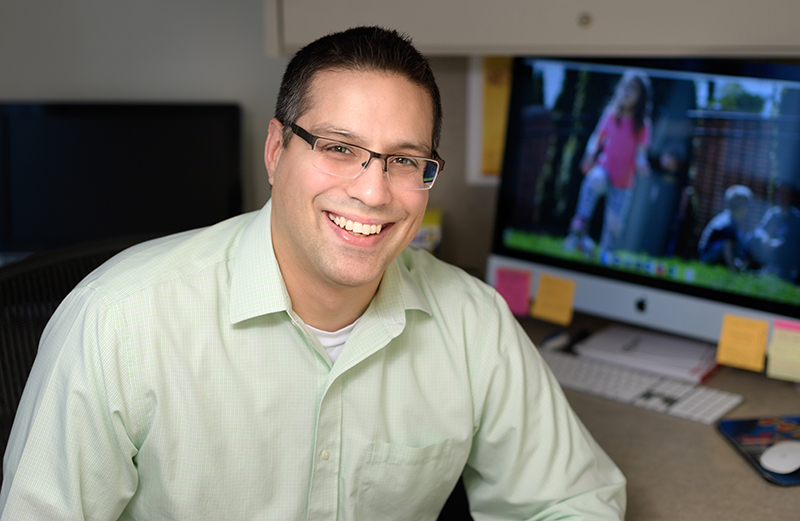Meet Murphy Award winner Derek Pacheco
English associate professor answers five questions about his teaching experiences and influences

Meet Derek Pacheco, one of two College of Liberal Arts professors who won the 2019 Charles B. Murphy Award, Purdue's highest undergraduate teaching honor.
Here the associate professor of English shares his thoughts on teaching with THiNK Magazine:
Q: Do you remember when you decided to become a teacher? What motivated that interest?
A: I can remember the first time I wanted to teach literature, back when I was an undergraduate. I took a seminar on Nathaniel Hawthorne and discovered that he wrote several children’s books, including "A Wonder Book for Girls and Boys (1852)." In it, he retells classic Greek myths as fairy tales for children. I remember being really surprised to learn that he wrote more than just novels like "The Scarlet Letter." There was so much joy and pleasure in that adaptation; I needed to share it. To this day, I still find the prose style in these books so compelling, relatable, and enjoyable.
For scholars of children’s literature, there’s an important difference between simple and simplistic writing. Simple is thought provoking and elegant, while simplistic is just shallow. In his preface to "A Wonder Book," Hawthorne says, “Children possess an unestimated sensibility to whatever is deep or high, in imagination or feeling, so long as it is simple, likewise.” That’s a lot like teaching. Effective instruction is making complex material seem simple, never simplistic.
Q: Who do you look up to in the teaching profession?
A: Over the years, there have been a few people who’ve really inspired me: my 12th-grade English teacher, Mr. Trevisani, who blew my mind by reciting lines from "Beowulf" (in Old English) and by acting out scenes from "Macbeth"; my undergraduate advisor, Michael Colacurcio, who loved puns and always kept his office hours; my graduate adviser, Barbara Packer, who made reading and discussing 19th-century literature feel like reminiscing with old family friends; and my partner, Nush Powell, who’s responsible for 90% of all my good ideas, and none of the bad ones.
Q: What do you find most rewarding about being an educator?
A: I love being up in front of the classroom, telling stories, talking about things I love with kids I like, always learning new things. One time, a student wrote to me, “I hope that I can follow your example and teach others to be curious about and even come to love those things that at first seem daunting to them.” It doesn’t get much better than that.
Secret confession? I love receiving thank-you notes. It doesn't matter if I’m recruiting prospective students to English, or writing a letter of recommendation for a graduating senior. I really appreciate it. First of all, thank-you notes are a lost art. They’re sociable, but personal, the opposite of social media. They take time. Handwriting is slow, too slow. People don’t have the patience for it anymore. So, when a student – a digital native – takes the time to handwrite a note? That’s special. That tells me our interaction meant something.
Q: What is the main rule you try to follow as a teacher?
A: I have two:
1. Thorin’s dying words in "The Hobbit" (a book I love to teach): “If more of us valued food and cheer and song above hoarded gold, it would be a merrier world.”
2. British Romantic poet Percy Shelley’s assertion, written to a friend who urged the best minds of the day to study economics and science rather than write poetry, which sounds a lot like the constant refrains about STEM today, “Poets are the unacknowledged legislators of the World.”
In other words, he teaches students not only that authors wield great power through the invisible influence they exert, but also that they must maintain responsible stewardship of this power. Teaching literature is a chance to show students that the liberal arts matter, that ethical thinking, respect for diversity, appreciation for the complex, and the capacity to explain complexities as accessibly as possible are indispensible skills, that, in an age of intensifying technological automation, empathy and humanity are our biggest strengths.
Q: What does winning the Murphy Award mean to you?
A: It’s very gratifying. I’m a kid from a working-class, immigrant family. I was one of the first to graduate from college. My father never made it past sixth grade. He worked as a college janitor to get his kids free tuition. So, education was a big deal for him. When I told my mom and dad about the Murphy Teaching Award, they were so proud – prouder than when I earned my Ph.D., even. They shared the news on Facebook, and random Portuguese people from all over the world congratulated them.